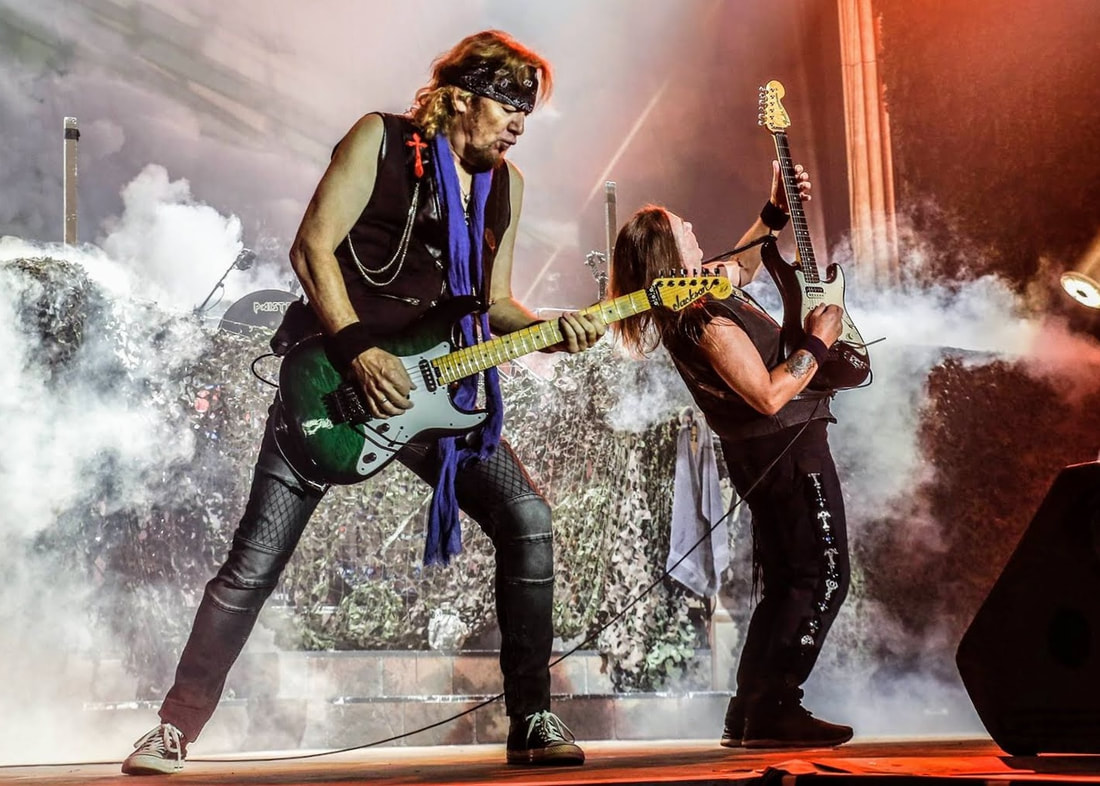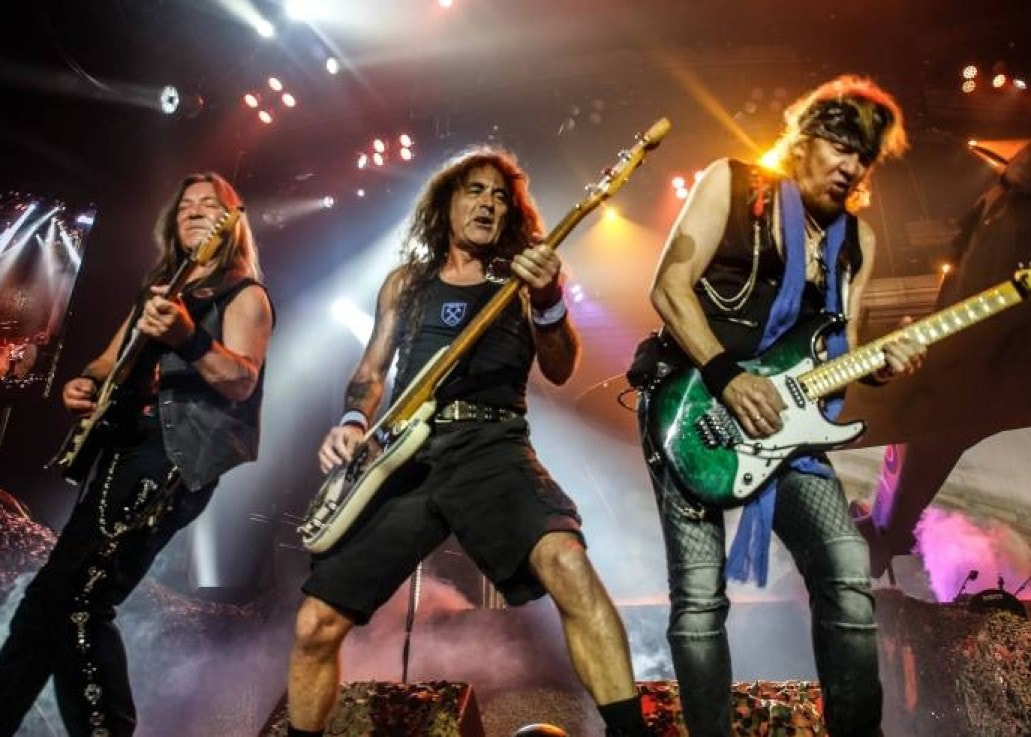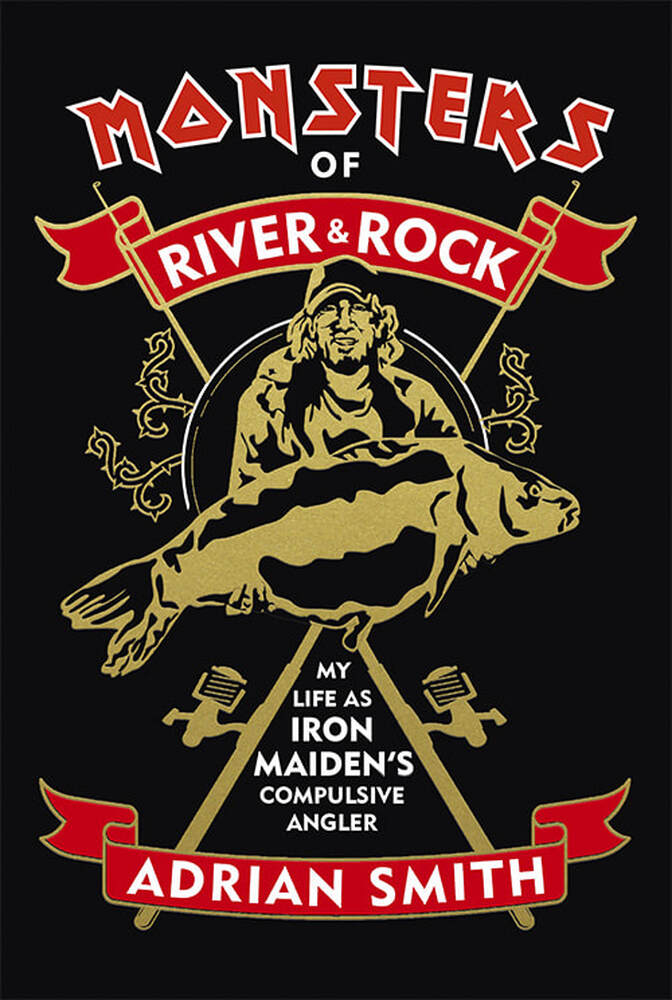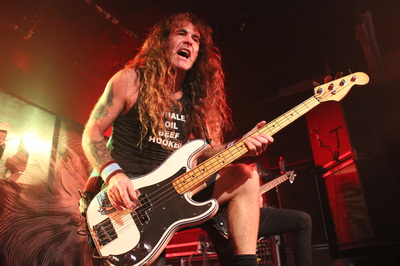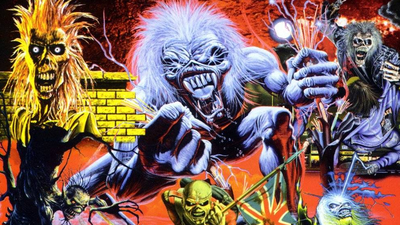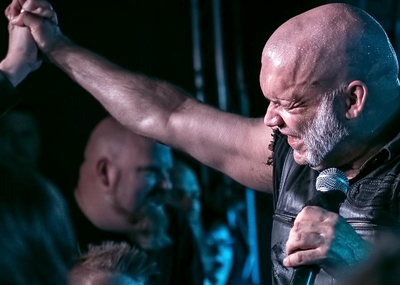|
As the guitarist and songwriter who wrote classics ‘Wasted Years’, ‘Stranger in a Strange Land’ and more, Adrian Smith’s status as Iron Maiden’s melodically-leaning six stringer is assured. What’s less well-known, is his love of fishing, however he’s about to cast aside all doubts with the release of his first book; ‘Monsters of River & Rock’, which details a lifetime in angling all over the world, as well as touching on his almost four decades (save for a break in the ‘90s) in his day job. We sat down with Adrian for an EXCLUSIVE chat about the book, his Irish roots, song writing, and much more. Out on the sea of madness; Eamon O’Neill
Hi Adrian, how are you today?
I’m good thanks, yeah. It’s very hot, so I’m quite happy sitting in the cool of my house at the moment. I’m speaking to you right now not too far from Ballinrobe, co. Mayo, which I believe is a town you’re familiar with. Yeah, my mother’s from there. I did spend some time there in the mid-‘80s, and yeah, I did some fishing around on the river Robe, and Lough Mask; Trout fishing. Yeah, fantastic, beautiful around there. In your new book, ‘Monsters of River & Rock’, you mention your mother’s fiddle playing; you appear to have inherited your nimble guitar-playing fingers from her. Haha, yeah, my mum, yeah, she didn’t play much later in life, but she’d get the fiddle out at Christmas and things like that, and she’d play all the jigs and reels; she loved that. She’d also read music; she was properly trained and everything. It’s well know that you’re a big Thin Lizzy fan, but did you ever consider going down a more traditional Irish / Celtic route, rather than the hard rock one you took? Well actually, if you listen to some of Maiden’s music, the guitar harmonies and some of the progressions, you know, there is an element of that. I loved Thin Lizzy. They had an influence, and there’s a definite Celtic influence; I mean, it kind of marries up well with metal, the Celtic thing, and also the stories, the folklore and all that sort of stuff. In the book you talk about the first time you played with Dave Murray, covering Thin Lizzy’s ‘Whisky in the Jar’, and Maiden did Lizzy’s ‘Massacre’, but as a big Blues fan, have you ever tackled any of Rory Gallagher’s catalogue? Yeah, I am, but no. I was probably more of a Thin Lizzy fan; Gary Moore. I mean, I like Rory Gallagher but Gary Moore, and all the Thin Lizzy guitarists were one of my main influences. When your book was announced, myself and some friends started coming up with some puns, including; “InWaders”, and you have a Gary Moore-related chapter titled ‘Parisian Carpways’. Haha, that’s a good idea! [laughing]. Yeah, “InWaders!”; that’s a great idea. I’m going to have to think of some more now. I’m going to be thinking of that all day! ‘Infinite Bream’, and all that. You make silly names for songs when you’re recording them. I couldn’t speak to you today without mentioning the passing of Martin Birch; how was it working with him in the ‘80s?
Well, firstly, it was very sad when he passed away. I was shocked, really, I mean, he was quite young still. He was only 71. Martin obviously did a lot of great bands; before us he did Purple and Sabbath. He was great, but he was a bit intimidating at first, because he had this big reputation. I’d never been in the studio to do a proper album before [1981’s ‘Killers]; I mean, I could hardly eat in the week leading up to going in the studio. But he had an air of authority about him because of his reputation. He also – as he reminded us on many occasion – he was a karate black belt, and there’s a few stories about that in the book; if he had a few drinks after a [recording] session, he’d start doing his karate routine and practising his kicks and his chops in the studio; you’d see all the roadies scurrying around moving the guitars out of the way in case he kicked the headstock off a vintage Les Paul or something! You worked with him on ‘Killers’, and I wanted to ask you about one of the songs from that session – ‘Twilight Zone’ – which has a really unusual harmony pattern; was that something you and Dave Murray worked out, or would Martin have had a hand in that? Martin never got involved in arranging music. He was a very, you know; ‘let the band shine’, and sit back and show the band in the best light possible; record it perfectly, don’t use too many tricks. Funny about ‘Twilight Zone’; that was a B Side of a single ‘Wrathchild’, and the single had to be out before the album, and so it had to be mixed and the B Side had to be done before the rest of it. We needed a B Side, and I think Dave had that riff for ‘Twilight Zone’. We kind of bashed it down very quickly. If you listen to the tempo, it’s quite, almost on the edge of being unplayable, it’s so fast! And, when we came to redo the guitars we had a hell of a job fitting that riff in to the drums. I actually wrote the whole harmony part. I don’t even remember Steve being there that much when we did it. I wrote all the harmonies and chord progression for that, and yeah, there is a few weird notes in there. Sometimes I’ll want to do a standard guitar; there is a standard 1st, 3rd; 1st, 5th; Steve likes to do, you know, make it slightly odd; he’ll put it in unison in one bit of it, and then go into a harmony, I think, because he doesn’t want to sound like Thin Lizzy, whereas, I love that – that’s my sort of template! But for that particular song, I think I came up with whole harmony part, we overdubbed the guitars, and it turned out really well, actually, and a lot of people say it should have been on the album. From studying your style, you developed a technique where you pick one string, and hammer-on the string above it, ie; in Wasted Years and Powerslave solos; where did that come from?
Yeah, it’s just something I came up with; specifically fretting notes on a high E string, and then hammering on the open B string. Obviously, it works great in the key of B, which the ‘Powerslave’ solo is in. ‘Wasted Years’, I do a thing higher up. It’s the result of noodling around, rather than any sort of musical, theoretical knowledge. But it sounds really good, it’s sounds very, quite complicated but it’s actually not; it’s a little trick, really. It’s a good little trick; there’s a song called ‘The Road to Hell’ as well on Bruce’s album [‘1996’s ‘Accident of Birth’], which I used it a lot! And you stole it and used it again for the live version of ‘The Wicker Man’, didn’t you? Yeah. [laughing], could have done! Yeah, [laughing harder], I mean, I try to construct solos with a beginning and end, a little mad flurry, a melodic bit; that’s just the way I kind of think. I hear a solo in my head and then I work out how to play it, usually. One of your signature solos is in ‘Stranger in a Strange Land’, a song you discuss in the book; it’s such an ethereal, melodic piece of music with an incredible mood. Yeah. I’ll tell you, we used to rehearse in the Channel Islands in Jersey, and I was on my way to get a root canal done, and I was on my way back and my face was throbbing, and it was pouring with rain, I was looking out at the sea out of the back window of the cab, and that riff popped right into my mind. And, I couldn’t wait to get back to my hotel. We had the whole hotel to ourselves, we had the gear set up and everything, and I worked the riff out and it all went from there. The story [of the exhumation of the body of explorer John Torrington, almost perfectly preserved in permafrost after over a century] was in the paper. It was just kind of a very moving story, and it went perfectly with the riff; this kind of desolate, kind of wasteland, and this sense of loss of hope, and it all sort of goes from there. You know, my playing, I like to think, I try and feel stuff, and I like the space to play in it, and that was probably one of the first song’s I was able to do that, on that album, because a lot of the Maiden stuff up until then had been very fast, and aggressive, and heavy, but that actually allowed me a little bit of space to stretch out a bit. It was nice, you know. So you’ve got more scope in the writing then. A lot of fans do wonder why it rarely gets played live, as it’s not been in the set since 1999; would you like to break that one out again? I would. It’s difficult to put it in a set because unless we do really fast stuff live, or we do very slow dramatic stuff; anything in the middle just has a sort of a mid-tempo from beginning to end, and the tempo of the song is crucial for ‘Stranger’. We tend to race with a lot of our songs, and most of it, it doesn’t matter - it just adds to the excitement – but with that song, with the energy, sometimes it can get… it’s hard to play live, you know? Back to fishing, and you speak so eloquently, and passionately about it; I even had to Google some of the fish you were describing.
Yeah, you don’t have the same species of fish in Ireland. I mean you have your tench, probably roach, rudd, pike, perch; that’s probably it. In England we have the barbel and the carp, which are very popular sport fish. There’s such a variety, and there’s such a lot of water in England, and I grew up with it. Since I can remember, my dad took me fishing, religiously, every Sunday. And I just got an appreciation for the countryside, even though we didn’t start fishing in the country; we used to fish in town, by the gasworks - this horrible stretch of the Grand Union canal, but there were these beautiful fish; these roach, and they were just so colourful, and bright red fins and sliver - I was absolutely fascinated - and the perch; beautiful fish, from this horrible looking place. And then later on we used to go out into Hertfordshire to go fishing, and that was like going on holiday for me, in the inner city. And I just grew to love being outdoors in the fresh air, in the countryside. Something I note about the book is that although it’s ‘Monsters of River & Rock’, it’s also a travel book, as you really bring your experiences in places like Tasmania and Canada to life; you seem to love travel when you’re not on the road. Well, I did then. You know, it was all just a constant; I didn’t really have a base in England at all in the ‘80s – sometimes I used to crash at my parents. I remember my parents moved house, and I’d only been there a few times, and I went home from a long tour, and I couldn’t remember where it was! I was knocking on all the wrong doors! I just had no base, so you were sort of a bit of a nomad in those days. So you’d finish a tour, and then decide to stay in North America and drive through Canada. And we just had the most incredible time; you know, float planes, wilderness lakes, encounters with bears and moose and all these incredible things. I mean, I’m from Clapton you know? I never thought I’d see all this, just an incredible adventure. In that same chapter you tell the story picking up Kim Mitchell’s ‘Akimbo Alogo’, and how you wanted to use its producer for the A.S.a.P album; how was the A.S.a.P experience, looking back? Yeah, it was a big step going out of Iron Maiden, you know? It started off, we had a fun project [the Entire Population of Hackney] Nicko [McBrain] and I, and we just started doing it. There was a period in the band where we had quite a bit of time – we had six months off – and Nick said; “I’m bored; do you want to play?” So we’d get together in London in a studio, and then we had my friend Andy Barnett, who used to play with FM and Urchin; Dave ‘Bucket’ Colwell, who played with Bad Company; Martin Connolly, who’s another fishing friend of mine – he’s in the book; and Dick Young who used to be in Urchin, on keyboards. So we started doing all this, we did a gig at the Marquee – there’s a few bootlegs around – we did a couple of gigs, and then a few years later, I’d written some songs, and the guys encouraged me to do an album; they said; “why don’t you do an album?”, and EMI were into it. But I wasn’t really sure want I wanted to do. I mean, I knew I wanted to do an album, but anyway, it was what it was, and it kind of got taken over a little bit, and it became a sort of a band thing, rather than a solo album. But no, I’m proud of it. I wanted it to sound more ‘produced’, you know what I mean? I kind of liked some of the ‘80s stuff at the time; the big fat snare drum, and the reverb, which we never had on Maiden - it was all very dry, and everything was under the microscope - I wanted a bit more of a bombastic production, and we certainly achieved that. I thought there was some good songs on there. On reflection, maybe we should have gone down a little bit more of a stripped down approach; a bit less keyboards, a bit less reverb, and I think songs like ‘Silver and Gold’ would have sounded more like Free, than American radio. But I think it shocked the guys in Maiden a little, but it shouldn’t have done, because Urchin wasn’t a heavy metal band. But that really sort set the pattern for the next year, and then I ended up leaving Iron Maiden! I don’t know, life’s a journey; what can I say? I wanted to touch on something from around this period; were you in contention for Def Leppard, when Steve Clarke died.
Well, emmm… [long pause] I was, yeah. Yeah I was. I’m not sure… I want to write more books; that might be in my next one! [laughing] There’s whole story about that, there’s a whole story about that. Read our interview with Def Leppard's Vivian Campbell, here. On that subject, as a follow up to ‘Monsters of River & Rock’, you’ve got to have a guitar book in you, haven’t you? Yeah, I was bitten by the bug when I was a kid, you know; Richie Blackmore, Paul Kossoff, all those people, I was just fascinated. I actually started off as a singer / guitarist. I was more of a singer because I hadn’t really played a guitar. I kind of blagged my way into Dave Murray’s world - he was already quite competent – by saying I was a singer. So we started jamming, and I learned as I went along. But yeah, I had a love/hate relationship with the guitar. I used to beat myself up about it. I was never really taught by anyone, I didn’t have a mentor; it was all self-taught. Don’t forget, at the time when I joined Maiden, we were going out with Judas Priest; we had Yngwie Malmsteen open up for us; Michael Schenker, and I was thinking; I grew up idolising Michael Schenker, and he’s opening up for me?! I just felt a bit of insecurity about it - not so much now, but because I didn’t really have any training. Read our interview with Yngwie Malmsteen here. Like I said, my formative years were spent more as a singer / guitarist, as second guitarist, and I relied on a virtuoso like Andy Barnett in the early days, or Dave Murray, but I think I’ve sort of grown into it over the years. I always considered myself more of an all-rounder; writer, singer, guitarist; it’s a bit like the fishing – I don’t specialise in any one kind – I’m a jack of all trades by nature, I think. You must have another album in you outside of Iron Maiden, because it’s been a number of years since Primal Rock Rebellion. I do, I do. I’m very excited about it, but I can’t say. I’m doing a lot of singing, but the person I’m working with, we’re sort of splitting the vocals. But that’ll be coming. I’m very excited about it, but I’m sworn to secrecy at the moment. Is there a possibility of any live dates from this project? Hopefully, hopefully. It depends on the bloody virus, you know? At the moment, everything’s screwed, so… Finally, do you still have all of your old guitars; the Ibanez explorer from 1982, the Deans, the Lado, or they just tools of the trade for you? Well, they have all been tools of the trade; I’ve used all these guitars; I very rarely buy something just to hang on the wall. But I’ve still got the guitars. They’re in a warehouse. I do get them out from time to time, and it’s great to. They all bring back memories, and pretty much every guitar has got a song in it somewhere, you know what I mean? You pick it up, and… The [Gibson] Flying V that I bought that I’ve been playing on this last Legacy thing [Legacy of the Beast tour], as soon as I picked it up, I came up with the riff to ‘Back in the Village’, the Maiden song. So that gave me a song, so it paid for itself many times over. So yeah, all these guitars have got stories and memories, so I’m really loath to part with any, so they’re all in storage, yeah. Like this interview? Like us on FaceBook and follow us on Twitter for regular updates & more of the same. For Iron Maiden vinyl, CDs and more, visit the Iron Maiden Townsend Music store. |
|
Adrian Smith
"I always considered myself more of an all-rounder; writer, singer, guitarist. It’s a bit like the fishing – I don’t specialise in any one kind – I’m a jack of all trades by nature."
© 2016 - 2024 eonmusic.co.ukContact: [email protected]
|

